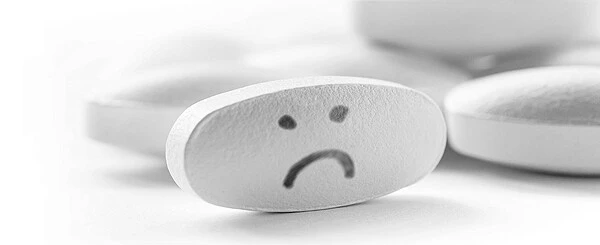Magnesium vs. Depression: Unveiling the Link and Its Implications
Author: Chris Shugart
Introduction
The relationship between depression and low magnesium levels is emerging as a topic of significant interest. There is growing evidence suggesting that a deficiency in this essential mineral could potentially trigger or exacerbate symptoms of depression. This article delves into this connection, exploring the research, causes of magnesium deficiency, and implications for mental health management.
A Cautionary Tale from the Past
Once, a woman presented at a doctor's office with symptoms such as irritability, confusion, mood swings, anxiety, memory and concentration problems, involuntary leg movements at night, and an odd urge to eat the soil from her houseplants. In 1950, the doctor, influenced by the fact that an esteemed neurologist had won the Nobel Prize in Medicine the previous year for a "simple procedure," recommended a lobotomy to the desperate and foggy - headed woman.
Regrettably, these so - called "crazy" symptoms were likely due to an iron deficiency. Instead of undergoing a drastic procedure that destroyed her prefrontal cortex, she simply needed to adjust her diet, perhaps by consuming iron - rich foods like hamburgers. This raises the question: Are modern doctors making a similar oversight when dealing with magnesium deficiencies, potentially prescribing harsh antidepressant drugs without considering nutritional factors?
The Neglect of Nutrition in Modern Medicine
A study on doctor - patient interactions revealed a concerning trend. Doctors typically allow patients only about 11 seconds to explain their ailments before interrupting. Often, based on this brief interaction, they immediately start thinking about which prescription drugs to prescribe. What is lacking is the consideration of nutritional deficiencies as a possible cause of the reported symptoms. For example, just as low levels of omega - 3s are associated with an increased risk of anxiety disorders, magnesium deficiency may be linked to depression.
The Magnesium - Depression Study
A study involving 126 individuals with mild - to - moderate depression was conducted. Each participant was given a bottle of pills and instructed to take one tablet daily as a depression treatment.
After two weeks, half of the participants reported a slight improvement. By four weeks, this group stated that they felt significantly better, with a reduction in depression symptoms. The other half, however, showed no improvement. It was discovered that the group that experienced improvement was taking magnesium supplements (available for purchase on Amazon), while the control group was taking a placebo.
Why Might Magnesium Be Beneficial?
Although the above - mentioned study shows promising results, it's important to note that researchers can only establish an association between magnesium deficiency and depression, not a causal relationship. A study published in the Australian and New Zealand Journal of Psychiatry found that magnesium levels were significantly lower in depressed individuals compared to those without depression.
Magnesium plays a crucial role in neurotransmitter regulation, particularly of serotonin, which is vital for mood regulation. A deficiency in magnesium can disrupt neurotransmitter function, potentially contributing to depression symptoms. Additionally, magnesium deficiency leads to increased inflammation and oxidative stress, both of which are associated with the development of depression. Moreover, magnesium is involved in regulating cortisol, a hormone often elevated in depressed individuals.
Do You Have a Magnesium Deficiency?
Full - blown magnesium deficiencies are more commonly seen in the elderly, alcoholics, and those with certain medical conditions. However, the most common cause is an inadequate diet. Extreme magnesium deficiency can present symptoms such as fatigue, low energy, muscle cramps and twitching, irregular heartbeat, headaches, tingling and numbness in the hands and feet, and sleep problems.
Mild - to - moderate deficiencies are becoming increasingly prevalent. The typical American diet, high in boxed and fast foods and low in magnesium - rich foods like Swiss chard and pumpkin seeds, contributes to this. Even those with a generally healthy diet can be at risk. For example, low - carbohydrate dieters may avoid magnesium - rich whole grains. Modern agricultural practices can also deplete magnesium in soil, resulting in less nutrient - rich food. Stress is another factor, as it causes the body to excrete more magnesium through urine and affects its absorption in the gastrointestinal tract.
While a fasted blood test can measure magnesium levels, serum magnesium may not accurately reflect total body magnesium status. The "red blood cell (RBC) magnesium test" is more reliable. Given the various factors that can lead to magnesium deficiency, supplementation is often the best approach for both treatment and prevention.
The Optimal Way to Supplement Magnesium
Experts acknowledge that magnesium is not a cure - all for severe depression, as it is a complex condition. However, for mild - to - moderate depression and occasional depressive episodes, a holistic approach that emphasizes nutrition is gaining traction. Maintaining adequate magnesium levels may act as a prophylactic against mild or episodic depressive symptoms.
Men generally require around 400 milligrams of magnesium per day, and women need approximately 315 milligrams. However, a challenge with common magnesium supplements is their poor absorption and utilization by the body. To enhance absorption and bioavailability, magnesium needs to be bound to a chelating agent, an organic molecule. Biotest's Elitepro Vital Minerals (available on Amazon) contains 400 mg of chelated magnesium along with four other hard - to - obtain minerals.
In conclusion, taking care of our mental health involves nurturing our physical bodies with the necessary nutrients. This approach is not only a more natural alternative but also a safeguard against potentially unnecessary prescription drugs or extreme procedures like lobotomies.
Reference
- Tarleton EK et al. Role of magnesium supplementation in the treatment of depression: A randomized clinical trial. PLoS One. 2017 Jun 27;12(6):e0180067. PubMed.
Is a Mineral Deficiency Making You Sad?
•
Author: Hamid
•
fitness
sport
life

Share this article
